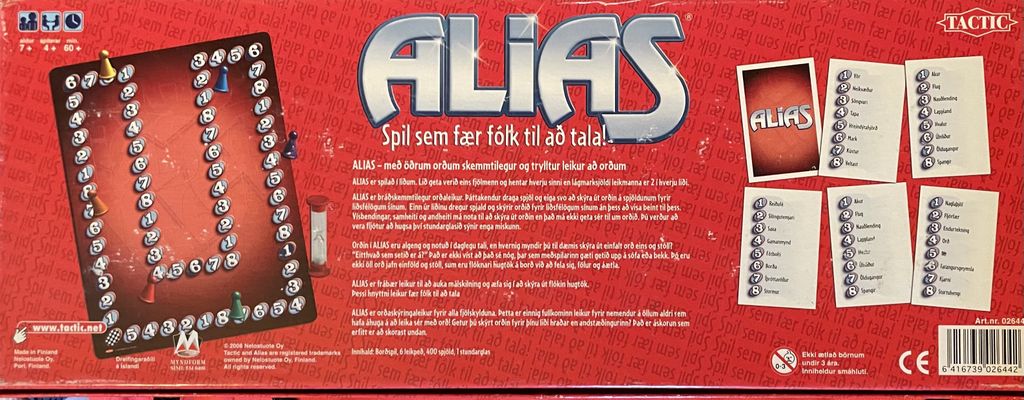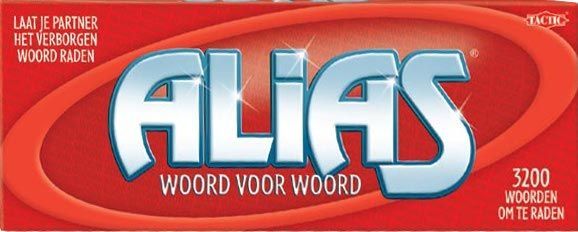If you’re like me, a board game night enthusiast, it’s always thrilling to test a new game. In this review, we’re tackling ‘Alias,’ a game where words become your best friends or worst enemies. You and your friends will dive into creative chaos, quick thinking, and, sometimes, hilarious misunderstandings. But is Alias worth its spot on your shelf? As always, I’ll share the good, the bad, and the funny with you in this review!
How It Plays
Setting Up
First, form teams. Grab the Alias board and word cards. Each team gets a pawn for the board. Place the board in the middle. Shuffle the word cards and place them within reach.
Let the fun begin!
Gameplay
The goal is to describe words to your teammates without saying the word itself. The timer keeps things moving fast.
You’ll laugh at how wild and creative descriptions can get. But beware, no peeking at the words!
Take turns describing and guessing. Teams alternate, and it gets chaotic. Everyone tries guessing as many words as possible before the timer runs out. Each correct guess moves the team’s pawn forward.
Teamwork and language creativity are your best friends in this game!
Winning the Game
The first team to reach the finish line on the board wins! As you move, other squares might add a twist to your turn. So, it’s not over until it’s over.
The team with the best descriptions and guesses takes the crown.
Want to know more? Read our extensive strategy guide for Alias.
Discovering the Mechanics of Alias
Alias is a board game that demands a blend of quick thinking, creativity, and teamwork. The gameplay mechanics revolve around players explaining words to their teammates without using the word itself or any of its derivatives. It’s like trying to describe “cat” without saying “feline”, “whiskers”, or “fur”. Sounds simple, right? Well, it sure is, until the sand timer mocks you with its relentless flow!
Teams take turns, alternating between the roles of guesser and explainer. The explainer picks a card and describes the word as fast as possible. The faster the team guesses, the more words they can get through before time runs out. It’s a bit like a whirlwind chat with your grandma who’s curious about “hip” terms, only with a lot more shouting and wild hand gestures.
One thing I noticed while playing Alias was the balance between skill and chance felt refreshing. Yes, there’s a tad bit of luck involved, but the core of the game remains skill-based. It’s about how creatively and swiftly you can explain the words, which keeps it exciting and fair for all. If you’re looking for a game where strategic thinking outweighs blind luck, Alias might just be your new best friend.
And now, as we continue this journey through the quirky world of Alias, let’s turn the spotlight on how team dynamics play a pivotal role in making or breaking the game.

Team Dynamics in Alias: The Magic of Collaboration
In the world of Alias, teamwork makes or breaks the game. It’s not just a battle of words, but a symphony of communication. Picture this: you’re in the middle of an intense round, the team’s guessing skills are razor-sharp, and you’re flying through words faster than a cat with a laser pointer in pursuit. It’s moments like these when you realize that the magic of Alias lies in its ability to highlight the beautiful chaos of team dynamics.
In Alias, every player has a unique role. Some are natural explainers, painting vivid pictures with words, while others are intuitive guessers, picking up on the subtlest of hints. It’s like that time I tried explaining ‘astronaut’ by mimicking zero gravity—it was a flop, but my partner’s wild guess nailed it. Laughter, frustration, and the occasional victory dance are all part of the exhilarating package that is Alias.
The game’s design encourages players to bond through wordless understanding. I remember a friend’s uncanny ability to guess words based on my random gestures and animated expressions. We were on fire until someone decided that ‘pineapple’ was an adequate explanation for ‘trampoline’. The team dynamic in Alias is a quirky blend of creativity and camaraderie, and it’s a blast to be part of.
Strategy comes into play too. Teams learn to read each other’s minds, anticipating moves like a chess grandmaster pondering their next play. It’s all about synergy, a dance of coordination, as the clock ticks menacingly.
Curious about how challenging Alias can get? Stick around as we jump into the intense world of its difficulty level.
Exploring the Difficulty Level of Alias
Alias comes in swinging with a difficulty level that is as unpredictable as my aunt’s cooking. But don’t let that scare you off! The game’s learning curve can be as gentle as a Sunday morning or as wild as a Friday night, depending on the crowd you play with.
First-timers can jump in without feeling overwhelmed because the rules are as simple as making a peanut butter sandwich, unless you’re allergic, of course. The real challenge lies in your ability to think on the spot and connect with your teammates’ wavelength. Imagine trying to guess ‘sardines’ when your partner is flapping their arms like a bird. It’s all about quick thinking and creative explanations, which can be hilariously challenging.
The cards in Alias offer varying difficulty levels, but we noticed after a few rounds, the words become as familiar as an old pair of socks. This could pose a challenge for those hungry for a twisty mental workout, but it’s perfect for casual gaming with pals. It’s sort of like a comfortable pair of shoes – easy to slip into and perfect for a quick stroll, but not quite the thing for running a marathon.
Though the fast pace can sometimes lead to frantic guessing, it’s the game’s simplicity that makes it a hit at parties, ensuring everyone from your super-serious friend to your wild cousin can join in the fun without needing a PhD in board-gamery. The next section will take us on a thrilling ride into the world of Replayability. Buckle up!
Replayability in Alias: Will it Keep You Coming Back?
Ah, replayability. The holy grail of board games. Just like that one song you can’t stop humming or that TV show you binge every year, a great board game will have you coming back for more. So how does Alias stack up in the replayability department? Let’s find out!
Alias is all about words, and words are like rabbits – they multiply endlessly! Every round presents a fresh challenge of explaining and guessing words. You’ll always need to think on your feet, keeping the game alive and kicking. The variety of words is pretty broad, ensuring that each game feels different from the last. Plus, it’s a hoot watching my buddy Max try to explain “platypus” without using animal sounds!
One thing that really helps Alias shine in replayability is its team-based nature. Each game invites new team dynamics and different strategies. You could face off with your besties or pair up enemies into a temporary truce. It’s fascinating to see who emerges as the wordsmith of the group.
However, I gotta mention, familiarity does breed contempt. Play it enough, and you might start seeing the same words pop up a bit too often. At that point, it might feel a tad like reheating last night’s leftovers.
In conclusion, if you’re looking for a game that’ll keep you and your pals entertained and guessing, I’d definitely recommend giving Alias a go. Just maybe keep a thesaurus handy for when those familiar words sneak back in.
Conclusion
Alias scores high on fun with its quick wordplay and teamwork elements. It’s a great pick for gatherings, combining creativity and a bit of chance. However, familiar words might weigh on its long-term appeal. Despite this, it’s a solid choice for lively nights. That wraps up my review!


